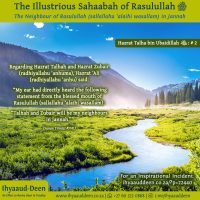Q: How many times should the takbeer-e-tashreeq be recited after every fardh Salaah? A: It should only be recited once. ويجب تكبير التشريق في الأصح للأمر به مرة (حاشية رد المحتار – 2/177) Answered by: Mufti Zakaria Makada Checked & Approved: Mufti Ebrahim Salejee (Isipingo Beach)
Read More »Recent Posts
November, 2010
-
11 November
When should the Takbeer-e-Tashreeq be recited
Q: When should the Takbeer-e-Tashreeq be recited? A: It should be recited after every fardh Salaah, whether the Salaah was performed individually or in congregation. وقالا بوجوبه فور كل فرض مطلقا ولو منفردا … إلى قوله: وعليه الاعتماد والعمل والفتوى في عامة الأمصار وكافة الأعصار (حاشية رد المحتار – 2/179) …
Read More » -
11 November
The position of Takbeer-e-Tashreeq in Deen
Q: What is the position of Takbeer-e-Tashreeq in Deen? A: Takbeer-e-Tashreeq is waajib in Deen. ويجب تكبير التشريق في الأصح للأمر به (حاشية رد المحتار – باب العيدين 2/177) Answered by: Mufti Zakaria Makada Checked & Approved: Mufti Ebrahim Salejee (Isipingo Beach)
Read More » -
10 November
Two Main Reasons for Forgiveness
Hazrat Mufti Ebrahim Salejee (Daamat Barakaatuhu) mentioned: Generally people are forgiven due to one of two reasons: Offering help and assistance to those in distress. Showing respect to the salient features or symbols of Deen or anything related to Deen. It is reported, when the wife of Haroon Ar-Rasheed, Bibi …
Read More »
-
Hazrat Talhah’s (radhiyallahu ‘anhu) Fear that the Wealth of the World should not Cause him to be Unmindful of Allah Ta’ala
Once, Hazrat Talhah (radhiyallahu ‘anhu) received a sum of seven hundred thousand dirhams from Hadhramawt. …
Read More » -
The Belief of Islam in Regard to the Origin of the Creation – Part Two – The Responsibility of Commanding with Good and Forbidding from Evil – Part Twenty Two
-
Hazrat Talhah (radhiyallahu ‘anhu) in the Battle of Uhud
-
The Belief of Islam in Regard to the Origin of the Creation – Part One – The Responsibility of Commanding with Good and Forbidding from Evil – Part Twenty One
-
The Lofty Position of Hazrat Abu Ubaidah (radhiyallahu ‘anhu) in the Sight of Hazrat Abu Bakr (radhiyallahu ‘anhu)
-
Receiving Seventy Rewards
Hazrat Abdullah bin Amr bin Aas (radhiyallahu ‘anhuma) reported, “Whoever sends salutations upon Nabi (sallallahu ‘alaihi wasallam) once, Allah Ta‘ala and His angels will send seventy mercies and blessings upon him in return of his one Durood. Hence, whoever wishes to increase his Durood should increase it, and whoever wishes to decrease his Durood should decrease it (i.e. if he wants to earn great rewards, then he should increase his Durood).”
Read More » -
Increase in Sustenance
-
The Reward of Fasting on the Day of Arafah
-
The Angel that Stands at the Blessed Grave of Hazrat Rasulullah (sallallahu ‘alaihi wasallam) to Convey the Durood of the Ummah
-
Reciting Durood when Entering the Musjid
-
Sunnats and Aadaab which every person needs to adhere to in his individual life – 8
20. The people one befriends should be people of piety and taqwa. Through taking such …
Read More » -
Sunnats and Aadaab which every person needs to adhere to in his individual life – 7
-
Sunnats and Aadaab which every person needs to adhere to in his individual life – 6
-
Sunnats and Aadaab which every person needs to adhere to in his individual life – 5
-
Sunnats and Aadaab which every person needs to adhere to in his individual life – 4
-
Hazrat Ali (radhiyallahu ‘anhu) – Part Forty-One – Being Sent by Rasulullah (sallallahu ‘alaihi wasallam) to Level the Graves, Destroy Idols and Erase Pictures
Hazrat Ali (radhiyallahu ‘anhu) reports that on one occasion, Rasulullah (sallallahu ‘alaihi wasallam) attended a …
Read More » -
Rasulullah (sallallahu ‘alaihi wasallam) Approving of the Verdict of Hazrat Ali (radhiyallahu ‘anhu) – Part Forty
-
The True Ulamaa – Hazrat Ali (radhiyallahu ‘anhu) – Part Thirty Nine
-
Du‘aa for Assistance in Settling Debts – Hazrat Ali (radhiyallahu ‘anhu) – Part Thirty Eight
-
The Concern of Hazrat Ali (radhiyallahu ‘anhu) regarding Business being Conducted According to the Islamic Principles – Part Thirty Seven
 Ihyaaud Deen An Effort to Revive Deen in Totality
Ihyaaud Deen An Effort to Revive Deen in Totality
















































































